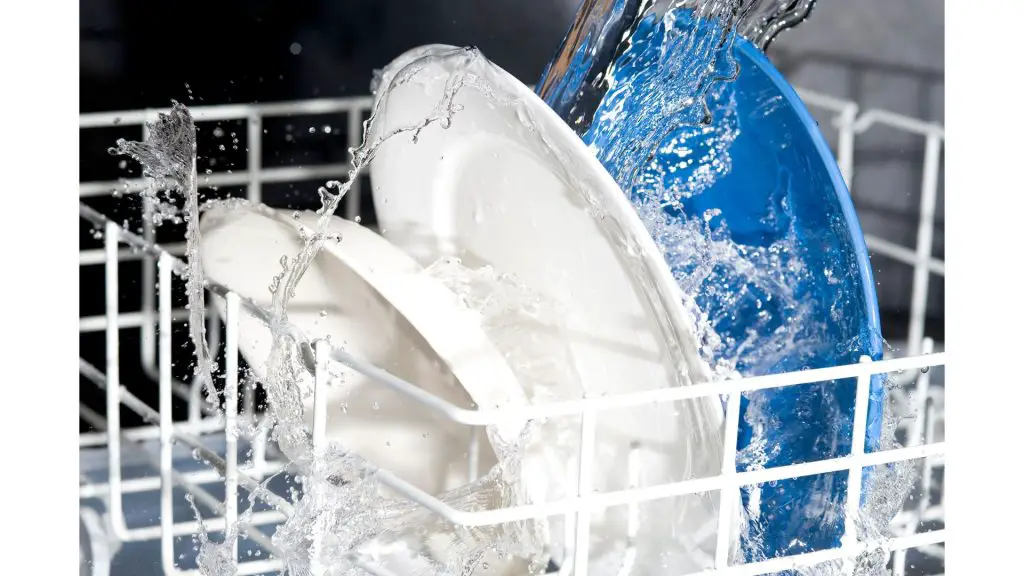GE Dishwasher Knocking Sound – Why?
- Dishwashers have spray arms that distribute the water. Most of the time, they create problems by either corroding or clogging. However, if you can hear rhythmic knocking, this GE appliances guide thinks the spray arms are hitting something inside the dishwasher.
- You have a water hammer. This is where the water hits a closed valve. Water enters the dishwasher when the valve opens. If the valve closes quickly and unexpectedly, the water will collide with the closed valve. The resulting sound is more like ‘Banging,’ and you can’t afford to ignore it because the pipes may incur severe damage in the long run.
- People blame water hammer knocks on bad valves. However, these sounds can manifest because of a kinetic energy buildup in the plumbing. A shockwave hits the pipes when the water flow stops suddenly.
- The dishwasher is not leveled. As a result, the dishes keep banging against each other because of the vibrations.
How To Fix It?
- Find out whether the spray arms are rotating freely. Remove any objects obstructing the spray arms. That includes the dishes. If you overfilled the dishwasher, reduce the load. You can also rearrange the plates to give the spray arms more room. The spray arms will leave scuff marks on whatever they strike. Use those scuff marks to identify obstructions.
- Inspect the spray arms. Are they bent? Spray arms can knock against objects in the dishwasher because of damage. Hard water leaves mineral deposits that corrode these components. If the corrosion has damaged the arms to the point of producing knocking and thumping sounds, replace them.
- Replace a defective valve. You should also hire a plumber to inspect the pipes. If they incur substantial damage, the plumber will replace them.
- Look for clogging. When spray arms develop blockages, they may wobble, leading to knocking and banging. Use toothpicks to remove the debris. You should only replace the spray arms if the knocking persists, even though you removed the obstructions.
- Hunker recommends a water hammer device for homes with water hammer knocking. A plumber can install this tool.
- Adjust the dishwasher’s legs to level the appliance.
GE Dishwasher Making Clicking Noise
- Some GE dishwashers click as they progress through a cycle. You may also hear the clicking at the beginning and end of a cycle. These sounds tend to originate from the control panel. GE blames the noise on a motor-driven switching device.
- The O-ring is not seated properly. This happens when a technician performs repairs. They may forget to restore this component correctly.
- The appliance has objects in the drain.
- If the clicking sounds more like snapping or crackling, you have arcing somewhere in the dishwasher.
- Something is caught in the pump impeller.
- Defective pump.
- The lid makes a clicking noise when you close it.
How To Fix It?
- Ignore the clicking if the sound is part of the dishwasher’s normal operations. If you check the manual, it may put you at ease by telling you to expect some clicking during the wash cycle.
- Fix the O-ring. Make sure the part is seated properly.
- Looking for loose connections and broken wires and fix them. Loose connections and broken wires can cause arcing. Don’t patch broken cables with electrical tape. Replace them with new wires.
- Clean the drain.
- Check the pump for obstructions. An inspection will tell you whether you need a new impeller and blade. You can solve the clicking noise by replacing the entire pump assembly. Unless you’re tech-savvy, you should hire a professional to determine whether or not you need a new pump.
GE Dishwasher Beeping Sound
- If you hear this sound every thirty seconds, the door opened during a cycle. The door must remain firmly shut during a cycle. The machine will warn you if it opens unexpectedly.
- If you closed the door, but the beeping has persisted, the door latch is faulty.
- GE dishwashers can beep incessantly to let the consumer know that something has gone wrong. Error codes usually accompany these sounds. But if you don’t see any error codes, troubleshoot the machine until you find the cause. Check the manual for clarification. The document may tell you what the beeping sound means based on the number of beeps.
- The control panel will beep whenever you press a button. Some models beep when you press the start button multiple times. It is worth noting that a start button can perform a reset. If you’re trying to reset the dishwasher, the beeping sound shouldn’t alarm you.
- The dishwasher has an electronic glitch.
- The spray arms can’t move freely because of obstructions.
- The control board is defective.
- The machine is overfilled with water. It wants you to take action before it floods.
How To Fix It?
- If you open the door during a cycle to add an item, the beeping will stop once you close the door, and the cycle resumes.
- If the beeping is associated with a general fault or malfunction, perform a reset by unplugging the machine for a few seconds or minutes. If the beeping persists, perform another reset. Sometimes, it takes multiple resets to eliminate the electronic glitch.
- Replace a faulty door latch. Inspect the entire door for defects.
- Rearrange the load. Make sure the spray arms can move freely. If you overcrowd the machine, remove some of the utensils.
- Replace a faulty control board.
- Find the source of the flooding and fix it. That includes faulty valves and blockages in the drain, hose, and pump. The beeping won’t stop until you drain the water from the GE dishwasher.
GE Dishwasher Making High-Pitched Sound
- You’re using the device for the first time. The pump seals are not sufficiently lubricated.
- The pump bearings are rusted or worn out. When this happens, the water pressure in the spray arms reduces.
- A power surge damaged the control module.
- The motor is old or defective.
- If you notice leaking water while inspecting the pump, the impeller seal has failed. You should also check the impeller. Is it dislodged? Is the fin broken?
- Clogging.
- Faulty inlet valve.
- According to fix-it-now, GE dishwashers can generate high-pitched sounds because of an open or shorted keypad on the touch panel.
How To Fix It?
- If the machine is new, adding water to the base will stop the noise by providing the necessary lubrication.
- You can’t fix a pump with worn-out bearings. A technician may do a patch job in an emergency. But you need to replace the pump to solve the problem permanently.
- Replace a damaged control module.
- Test the motor for continuity. Make sure the component is dead before you replace it.
- Clean the pump. A dirty pump can contribute to the dishwasher’s high-pitched noises.
- Inspect the inlet valve. Do you see restrictions? Sometimes, tightening the hose connection can eliminate the high-pitched noise.
- Unclog the dishwasher. That includes the pump, sump, and spray arms.
- If the impeller is broken, talk to GE’s customer support staff. They will advise you. In some cases, you can replace a broken impeller. In others, you must replace the entire pump.
- Replace the control board. The board isn’t always at fault. But if every other component is okay, people usually blame the control board because it runs everything. This is the last item they replace.
- Replace a touch panel with an open or shorted keypad.
GE Dishwasher Grinding Sound

- If you have a garbage disposal, the appliance makes a noise when it runs. Some people use ‘Humming’ to describe the sound it makes. Others call it grinding. If you’re not accustomed to the sound, probably because you’ve never owned a garbage disposal unit, it may surprise you.
- The dishwasher is clogged. This is a common occurrence because homeowners forget to clean the filter.
- Hard objects are stuck in the drain. You can’t call this a blockage because the water can still flow.
- The circulation pump motor has worn-out bearings.
- The impeller is dislodged or damaged.
- Debris is stuck in the chopper blade. This happens when the chopper blade encounters hard objects. It usually cuts up soft debris before it reaches the drain.
How To Fix It?
- Inspect the pump for blockages and unclog it where necessary. Clean the dishwasher regularly to prevent clogging. If you allow obstructions to grow, they may become impossible to remove. For instance, some drain hoses become so clogged that you must replace the entire hose to fix the issue because removing the obstructions isn’t an option.
- If you can’t find blockages in the drain or pump, you need a technician to inspect the appliance. One or more components are rubbing against the wrong surface. Make the spray arms the first items you check. They can collide or scrape against the dishware while rotating.
- You can’t fix the individual bearings on a pump. If they fail or wear out, you need a new pump. Your technician may offer some temporary fixes, but the only permanent solution is a replacement.
- Remove the debris in the chopper blade. You can also replace a defective chopper blade. Accessing the chopper blade is difficult because you must first remove the drain pump housing.
- Replace an impeller with a broken fin.
- Check the drain for broken glass and plastic items. Remove them.

